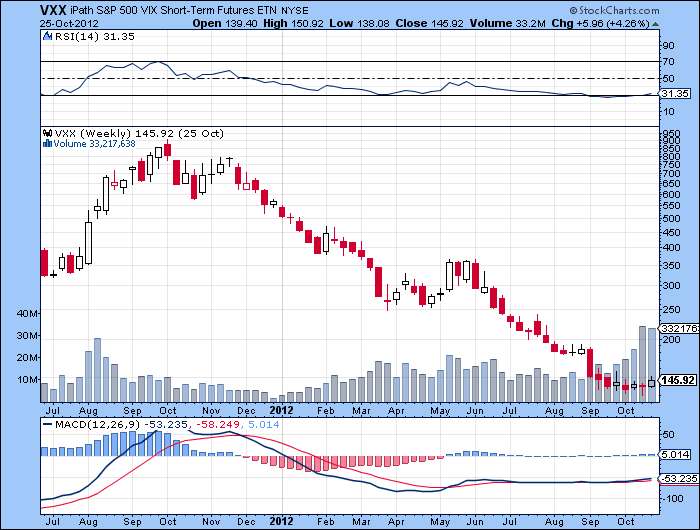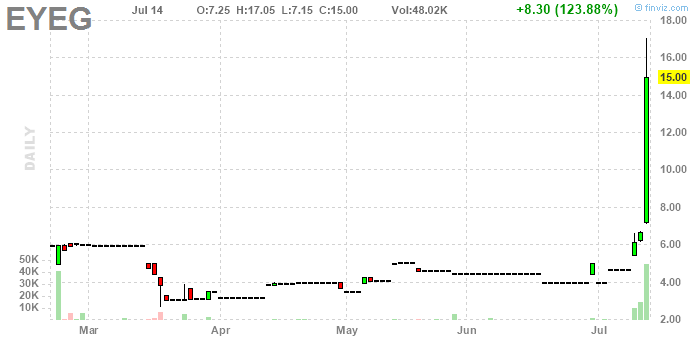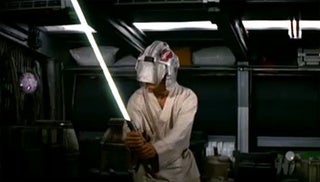I'm taking Adam Grimes' online course. It's free and can be
found here. As an opener, Grimes cites the market adage I have in the title and asks "who are you?
Who Am I?
In my past reflections and market musings, I've come to the conclusion that trading
is a game we play against ourselves. It's now time to size up my opponent.
Background
My initial interest to the markets was during the go-go period of 1998-2000. I was in college. I have a distinct recollection of a 60 Minute episode that portrayed day traders. The gist of the program was that people were quitting their jobs in masses to trade the markets and they were making fortunes--except the ones that lost fortunes. I was making $7 bucks an hour and I was hearing about people making 10K in a day. I thought that sounded like the coolest job ever.
I was still risk adverse and had no plans to day trade. Nonetheless, I convinced my parents to let me open an investment account at E-trade and I put some of my college funds in the account.
My First Trades
Shortly after opening my trade account, I read a Money magazine article about stock picks and Knight Trimark (NITE) was one of the recommendations as they were a market maker who would make money on every online trade. In addition, I picked Etrade as I figured I would now be using their services so I might as well be an investor. Call it beginner's luck because these trades were absolute home runs. NITE, which I had bought in the 40s would run upwards of $150 and split 4/1. Etrade made a similar parabolic move.
Of course, that was not entirely unusual during the period, stocks like AMZN, EBAY, CSCO, JDSU, JNPR were going parabolic. And then there was QCOM. One of my college buddies had bought 300 shares when it was a $15 stock. He was up over a hundred grand, when he told me about it. I didn't buy but I did buy his next recommendation RMBS.
I was doing a lot of reading mostly on yahoo messages boards. It was all half-hazard approach but it all worked. Everything worked back then. Anyway RMBS looked like it was at support (or at least what I had believed was support) I bought 100 shares at 60. I would sell it 3 months later for over $200-- (it ran to $470 and split 4/1. )
At that point, I started getting into swing trading. I came across a guy called "TraderMike." (He now has a site called
Wallstreetwindow.) This was really my first foray into swing trading. Trader Mike had a free newsletter or email list in which, he would send out a watch list. These stocks were usually hitting 52week highs. The day after doing so, they would nearly always gap up. 10-50%. I was making money with this method but I never really understood position sizing or risk management and those types of things. I had some big winners a $6000 1 day winner in JMAR on a 50% gap up comes to mind.
Bubbles pop and the internet bubble popped magnificently. All things considered, I came out relatively unscathed. I gave back some profits, I big losses on a stock called InfoSpace, but I had sizable profits that I had retained.
Tradermike made a call that Gold wold be the next thing...and it would be. But when gold was still $400 an ounce there were no ETFs. You had to buy the miners. While this could have been the trade of the decade, I lost money. As I look back on it, I had no idea on how to buy a set up. I was constantly shaken out of stocks like NEM, GG, RGLD and became discouraged despite the parabolic rise in gold over the next decade.
CBOE
I was serious about being a trader and coming out of college I landed at an option market maker as a junior trader. My job responsibilities included placing trades on other exchanges to spread risk for our traders to spread and basically learning how to trade. I was to go through an intensive 6 month training program. Mock trading, option theory, strategy. After that time, I was to get a badge and begin trading. It didn't work out that way.
The market popped in a big way, After 9-11, the market got a huge surge in volatility then the volatility dried up. When volatility dried up, market maker profits go down. Everyone on the floor was hemorrhaging money. The firm was not anxious to put new traders on the floor as it, and every other firm, were firing their existing traders. It became a very depressing place to work as our mentors were being let go. I never got my badge and a year after starting the trainee program was discontinued and I was out of a job.
I became very jaded on trading in general but one good thing about taking the job at the CBOE was that trading in personal accounts was strongly discouraged due to conflicts of interests, etc. After I was let go, I went on to more schooling. My trading profits were spent on tuition. As I worked towards my new career, life got in the way and my trading fell mostly by the wayside.
The Next Chapter--Discouragement
Most traders go through the discouragement when they first start to trade. I got mine a decade later after I attempted to trade again. I tried to keep up on the market and would read seeking alpha articles on various stocks. I wanted to get back to trading but I had convinced myself that it is now too difficult. I read about the complexity of the various hedge fund strategies, paired trading, high frequency trading, automated trading and all that good stuff. I was convinced that trading again was beyond my capabilities and it would be a fool's game to try.
In 2011, I placed some long term trades after the market sold off very large. I bought MO, DIA, JNJ. I did well, but as I attempted to move towards shorter term strategies my results were not that impressive. I would win on most of my trades but then shit like an elephant when I lost. I had no concept of proper money management.
Fortunately, I then came across "Step Into My Trading Room" by Alexander Elder. I learned the importance of the 2% rule--- no trade risks more than 2% of your equity and the importance of keeping a trading journal.
I would like to say that everything suddenly made sense and I started following all these rules and became a profitable trader at that point, but that's not what happened. Here's what really happened:
I was initially hindered by positions I had that were not really trading positions. But I didn't want to simply sell them because I had read a few books. My trade selection was poor, It was a difficult time in the market and I fared poorly and lost interest.
In 2013, I took a look at some beaten down stocks that I thought could make comebacks. I bought NOK and BAC. Both stocks made come backs over the course of the year but my returns lagged the market badly. But I made a strong charge at the end of the year.
It was this move, that revitalized my interest in trading again. NOK sold out its handset division to MSFT. I then did a few more profitable swing trades and my account had recovered.
2014- My Breakout Year?
I've eventually learned to define my setups, find profitable setups, and make money. This was not exactly a smooth year. I've had numerous relapses into past bad habits but I am now confident I can succeed and I've done so:
Self Assessment
Here's where I am at this point in my development as a trader. It is an honest assessment and a transparent assessment.
Strengths:
- I have defined my setups.
- I have defined my risk tolerance
- No hesitation to take a trade.
- No regret about missing a trade
- Not usually afraid to re-enter a stock at higher prices if the setup warrants
- I go into a trade with the mainframe how much will I lose. This frame of mind has allowed me to properly position trades and to avoid hype
- I still have confidence in my setups even after multiple losses in a row.
- I can overcome multiple losses in a row with 1 or 2 profitable trades.
- For the most part, I have been able to immediately take losses.
- I've been able to consistently find profitable setups.
- I've made some very good counter-trend trades.
- I've bought well for the most part.
- I've avoided significant drawdowns.
- I can research stocks for profitable shorts.
- Transparency --
- My trade journal remains an open book. By keeping it open to the public, I force myself to be accountable. It helps me follow my rules and my setups. It is also a very helpful tool to see how stocks I've traded in the past acted on past trades.
Weaknesses:
- I occasionally take impulsive trades that do not always fit my set up criteria
- I'm too influenced by trade recommendations of people I respect.
- I take profits too early on many breakout trades.
- I am uncomfortable when a stock Rips in my favor.
- I am uncomfortable when a breakout buy fades -even if just a small amount so I sell
- On a handful of occasions, I've froze and not taken a loss when I should have and I have broke my 2% rule.
- I've fallen prey to the sirens call of massive profits and have traded too big at times.
- I've not been able to consistently stay in trends. I captured only 1 big trend this year.
- My selling criteria are not as well defined as my buying criteria.
- I have little conviction in any particular trade.
- I migrated from strategy to strategy a little too haphazardly.
Year Highlights
- I caught a 50%+ trend trade in HCLP
- I developed a setup to trade low price momentum stocks profitably, which has delivered gains over 50% on a few stockss
- I've traded continuation anticipation setups well
- I have found a trading community that I very much enjoy.
- Having the resolve to recovering from a trade that took 9% of my equity.
Goals
- Catching a superstock / EP early
- Staying in stocks that are moving in my favor longer
- Gaining conviction in individual trades.
- Fewer mistakes.

























